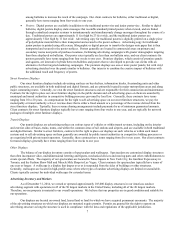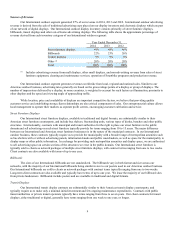iHeartMedia 2014 Annual Report Download - page 19
Download and view the complete annual report
Please find page 19 of the 2014 iHeartMedia annual report below. You can navigate through the pages in the report by either clicking on the pages listed below, or by using the keyword search tool below to find specific information within the annual report.17
Our iHeartMedia business is dependent upon the performance of on-air talent and program hosts
We employ or independently contract with many on-air personalities and hosts of syndicated radio programs with significant
loyal audiences in their respective markets. Although we have entered into long-term agreements with some of our key on-air talent
and program hosts to protect our interests in those relationships, we can give no assurance that all or any of these persons will remain
with us or will retain their audiences. Competition for these individuals is intense and many of these individuals are under no legal
obligation to remain with us. Our competitors may choose to extend offers to any of these individuals on terms which we may be
unwilling to meet. Furthermore, the popularity and audience loyalty of our key on-air talent and program hosts is highly sensitive to
rapidly changing public tastes. A loss of such popularity or audience loyalty is beyond our control and could have a material adverse
effect on our ability to attract local and/or national advertisers and on our revenue and/or ratings, and could result in increased
expenses.
Our business is dependent on our management team and other key individuals
Our business is dependent upon the performance of our management team and other key individuals. A number of key
individuals have joined us or assumed increased responsibilities over the past several years, including Robert W. Pittman, who became
our Chief Executive Officer on October 2, 2011, C. William Eccleshare, who was promoted to be our Chief Executive Officer—
Outdoor on January 24, 2012, and Richard J. Bressler, who became our President and Chief Financial Officer on July 29, 2013.
Effective January 2014, Mr. Pittman and Mr. Bressler assumed direct management responsibility for our iHeartMedia division in
addition to their existing roles. Although we have entered into agreements with some members of our management team and certain
other key individuals, we can give no assurance that all or any of our management team and other key individuals will remain with us,
or that we won’t continue to make changes to the composition of, and the roles and responsibilities of, our management team.
Competition for these individuals is intense and many of our key employees are at-will employees who are under no legal obligation
to remain with us, and may decide to leave for a variety of personal or other reasons beyond our control. We are currently
contemplating modifying certain roles and responsibilities of specified members of our management team to more align with their
operational focus. If members of our management or key individuals decide to leave us in the future, if we decide to make further
changes to the composition of, or the roles and responsibilities of, these individuals, or if we are not successful in attracting,
motivating and retaining other key employees, our business could be adversely affected.
Extensive current government regulation, and future regulation, may limit our radio broadcasting and other iHeartMedia
operations or adversely affect our business and financial results
Congress and several federal agencies, including the FCC, extensively regulate the domestic radio industry. For example, the
FCC could impact our profitability by imposing large fines on us if, in response to pending complaints, it finds that we broadcast
indecent programming or committed other violations of FCC regulations. We could face significant fines, for instance, as a result of
pending FCC investigations into the allegedly inappropriate broadcast of emergency alert signals by several of our stations.
Additionally, we cannot be sure that the FCC will approve renewal of the licenses we must have in order to operate our stations. Nor
can we be assured that our licenses will be renewed without conditions and for a full term. The non-renewal, or conditioned renewal,
of a substantial number of our FCC licenses, could have a materially adverse impact on our operations. Furthermore, possible changes
in interference protections, spectrum allocations and other technical rules may negatively affect the operation of our stations. For
example, in January 2011, a law that eliminates certain minimum distance separation requirements between full-power and low-power
FM radio stations was enacted, which could lead to increased interference between our stations and low-power FM stations. In
March 2011, the FCC adopted policies which, in certain circumstances, could make it more difficult for radio stations to relocate to
increase their population coverage. In addition, Congress, the FCC and other regulatory agencies have considered, and may in the
future consider and adopt, new laws, regulations and policies that could, directly or indirectly, have an adverse effect on our business
operations and financial performance. For example, Congress may consider and adopt legislation that would impose an obligation
upon all U.S. broadcasters to pay performing artists a royalty for the on-air broadcast of their sound recordings (this would be in
addition to payments already made by broadcasters to owners of musical work rights, such as songwriters, composers and publishers).
Moreover, it is possible that our license fees and negotiating costs associated with obtaining rights to use musical compositions and
sound recordings in our programming content could sharply increase as a result of private negotiations, one or more regulatory rate-
setting processes, or administrative and court decisions. We cannot predict whether such increases will occur. Such legislation and/or
increased royalty rates and negotiating costs could have a material impact on our operations and financial results. Finally, various
regulatory matters relating to our iHeartMedia business are now, or may become, the subject of court litigation, and we cannot predict
the outcome of any such litigation or its impact on our business.
























